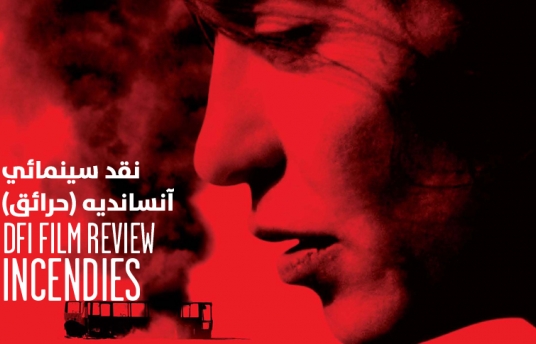DFI Film Review: Incendies (2010)
Aug 14, 2011

Written by Reem Saleh, New Media, DFI
Film: Incendies
Year: 2010
Director: Denis Villeneuve
Stars: Lubna Azabal, Mélissa Désormeaux-Poulin and Maxim Gaudette
Genre: Drama, Mystery, War
The story begins with a will, which Nawal (Lubna Azzabal), a Canadian expat with Middle Eastern origins, leaves behind for twins Jeanne (Mélissa Désormeaux-Poulin) and Simon (Maxim Gaudet). The will consists of two sealed envelopes with instructions for delivery listing Jeanne and Simon’s supposedly late father, and their recently discovered older brother. From that point forward, the twins embark upon an adventure in a war-torn country, with the sole purpose of unlocking the mystery left behind by their mother; a mystery providing a gateway to their homeland and origins.
The magnificent prologue of the film speaks volumes, with a beautiful, seemingly serene hilly landscape tricking the audience into a false sense of security. The camera then slowly sweeps across a room full of young boys either with clippers shaving their heads to a military standard, or receiving terrifying looking arms. The camera pauses on one boy with piercing eyes, looking at us in a moving combination of fear, anger and resentment as his hair falls on his shoulders, rendering him bald and ready. In the background, Radiohead’s ‘You and Whose Army’ hypnotises us, imprinting the powerful image in our memory – one which will strongly be recalled later on in this film. This scene alone is worth sturdy artistic praise.
Face down, naked and without a memorial is the burial instruction left behind by the apparently tortured Nawal, with a haunting quote noting that, “…childhood is a knife in the throat that you can’t easily take off”. The children realise that a gravestone can only be added when the puzzles of their mother’s past are unlocked with the delivery of the letters within the cryptic will.
Based on a play by Wajdi Mouawad,‘Scorched’ which I am not familiar with, but one could feel tell that the screenplay adaptation turned Mouawad’s work into a respected and admired, multi award winning picture. The film garnered international attention, with twenty wins in total at various festivals, including an Oscar nomination for Best Foreign Language Film. ‘Incendies’ was also one of the most highly praised films screened during the second edition of the Doha Tribeca Film Festival (DTFF), encouraging further exploration into its appeal.
Can war be poetic? With Villeneuve, this is possible. It is also romantic and ruthless, combining the most extreme of human emotions, leading to radical choices like the Christian Nawal’s recruitment by Muslim militia. The poetic narrative exposes idyllic sceneries that the director focuses on often, revealing shortly after the truths of a raw, harsh and poignant reality. .
From the moment Jeanne lands in the Middle East we are transported to stories from her mother’s history. Although the country’s name is fictional, the historical details fail to belie the nation in question is in fact Lebanon. Every location she visits is alternated with a parallel memory from her mother’s past, featuring ferocious battles, both as just a woman and also as a political activist. As soon as Jeanne infiltrates her Nawal’s hometown, she is exposed to the complex hatred that society continues to struggle with, even years after the war has ended. The villagers blatantly refuse Jeanne assistance upon discovering she is Nawal’s daughter, without any mention of her mother treated like a taboo.
While Simon is resisting his mother’s enforced wishes, it is Jeanne who initially takes the solo initiative to seek closure. Throughout her adventures, we learn that this same, unfriendly village appears to be the basis of Nawal’s struggles upon falling pregnant with a Palestinian man who was brutally murdered by her own brothers. Drowned in the shadow of disgrace by everybody in the village due to falling pregnant, Nawal delivers a boy who is taken away from her upon birth. With a tattoo marking his shin, Nawal had vowed to find her child at any cost, only to be driven out of the village for fear of persecution and even death. This is when she takes drastic decisions out of anger, resentment and fear, just like the boy at the opening of the film.
The war is not just the context but explains – regardless of one’s political stance – that there’s more to what people choose to practice and preach than mere ideals. Nawal’s decision to join the militia was primarily born out of despair and the injustices she suffered. In the style of a mythological Greek tragedy, the plot then cleverly reveals key information within every step the twins’ detective efforts reaped. After years of absence, it becomes obvious to them that war had never really left all of their mother’s past protagonists, but lived on and festered within them.
Although the children had considered their mother as nothing more than a neurotic, unstable character, the journey they embark on honours what is in fact a valiant woman, also known as “the woman who sings”. The past was too painful to be easily forgotten, and it seemed they had never really understood their mother.
The film is picturesque, memorable in every scene, surprising, tense and mysterious in parts. Villeneuve portrays a vulnerable and curious vision from Nawal’s viewpoint, one that is applicable to any person regardless of religion and political parties, but sharing the same circumstances. For someone who is unaware of the conflict of the Middle East, the narration carries no judgment as to innocence and guilt, or what may be considered right or wrong. As with war in general it is a personal perspective which highlights how one’s worst enemy can also be a precious part of oneself. It is the story of struggling women, star-crossed lovers and suffering mothers and the personal journey of a life, and family legend, tainted by war and society.
video#1